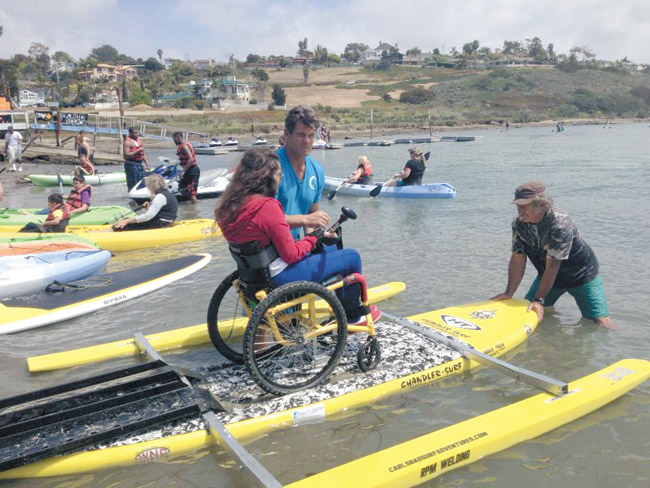They’re On It Because Of Onit

Kailua native Kawika Watt hands a paddle to a woman on an Onit Ability Board at Oceanside Harbor in San Diego
PHOTO COURTESY ONIT ABILITY BOARDS
Kailua native Kawika Watt may no longer call Hawaii home, but his heart and soul are still deeply rooted in the Islands.
The 56-year-old Watt, who now lives in San Diego, credits memories of his childhood for the revolutionary piece of adaptive sports equipment that is changing the lives of people with disabilities.
“I give surf and SUP lessons in Carlsbad, and every time I encountered someone who had trouble balancing, I thought of my youth in Hawaii,” says Watt. “I thought if I put outriggers on these boards, people would be able to stay on it and not fall.”
It was the origins of an exciting idea that Watt would take one step further. Instead of creating a product to help people with balancing challenges, Watt thought, why not develop something that would get those with disabilities out on the open water.
In 2013, he and his partner James Rouse created Onit Ability Boards, a creative way in which people with spinal cord injuries can take to the water using a wheelchair attached to a paddleboard system.
Watt recalls the early stages of the process.
“When we were doing the prototype, we did a lot of experimentation,” says the Kailua High grad with a chuckle. “The first one was overbuilt. It weighed about 600 pounds and it was for two people. It was very secure but more board than we needed.”
Watt reached out to those with disabilities to hear what they needed and wanted. The end product is something everyone is very proud of.
Watt says the company’s mission statement is very simple, “Get Everyone Onit.”
“The more barriers we can help break down, the more productive and more active people can be,” says Watt. “I want to help people get in shape and in the water.”
Watt says the board has been used in flat ocean conditions, harbors and even rapids in Montana. And although it is not designed for wave riding, Watt says anything is possible when he looks to the future.
“The chair is important for loading and unloading people,” explains Watt. “You can literally put the chair on the board. People roll right up, we put them in the water and they go! It’s that easy!”
Watt hopes to grab the attention and support of a major corporate sponsor, which can assist in bringing the boards to Hawaii. He’s hopeful it can happen in the next few months.
“The interest from the Islands has been pretty great lately, but I hope we can create even greater interest back home,” says Watt. “For one, the technology is from the Islands, but more importantly, I want to work with local organizations, help them raise money so we can buy these boards at a great price and donate them to help serve others.”
The entire system, which includes a board, outrigger, ramps, chair and hardware, costs about $5,000, which is cheaper than many wheel-chairs. Watt says he’s not interested in making millions off his idea. In fact, his inspiration was never about money.
“My heart always has been about volunteering, and when our business started taking off, I didn’t want it to be a part of the business side of it. I wanted to continue working with people,” he says humbly. “The financial end of it was never important to me. I live in the water and I was raised in the water. I want others to enjoy the water as much as I have been able to, and I’m going to be there for anyone who wants it.”
For more information, go to onitabilityboards.org. rkmizutani@gmail.com





